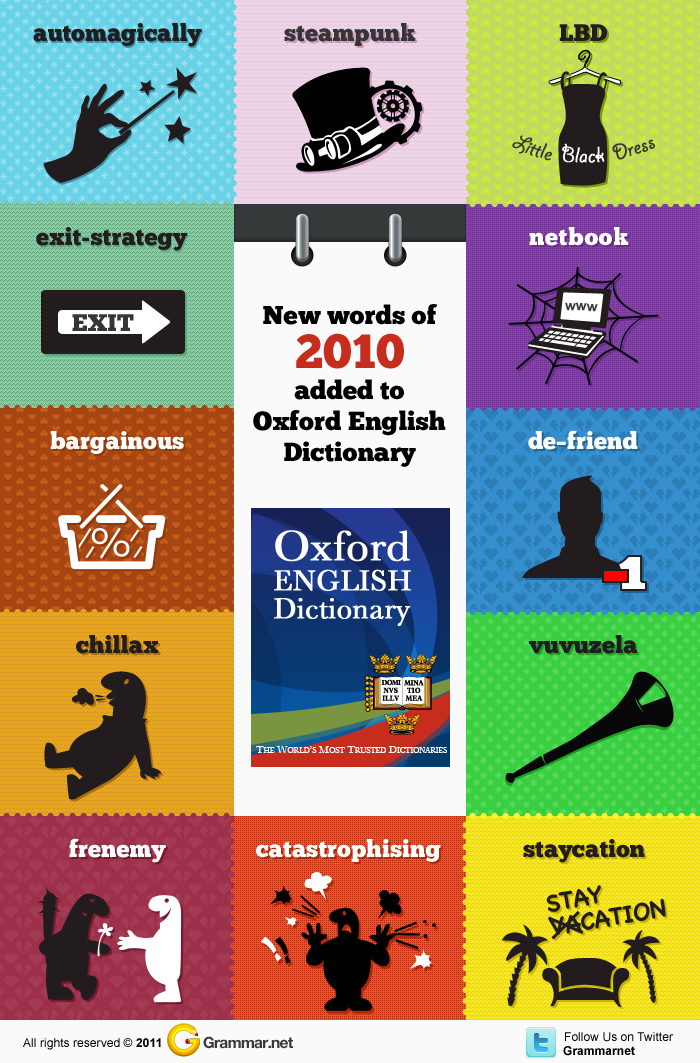Oxford University Press has one of the largest language research programs in the world and continuously scours the internet, popular fiction, science journals, and even song lyrics for words creeping into the English language. At one time, 2-3 years of use was required before a new word/term appeared in the Oxford English Dictionary, but the internet has cranked the speed of language evolution. Oxford says, “We select those which we judge to be the most significant or important and those which we think are likely to stand the test of time.”
Infographic is clickable.To download high resolution poster click here.
Embed this image to your site:
Automagically
Something has happened that is unexplained or seems almost magical. “I tried to put that piece in twice, but on the third try, it automagically fit”.
Steampunk
One of the new words in English 2010 that is actually an old concept, “steampunk” is a science fiction genre with steam-powered machinery, people in Victorian clothing, with plenty of gears and goggles. “The Time Machine”, “20,000 Leagues Under the Sea”, and “Frankenstein” are steampunk novels.
LBD
“Little black dress”–typically short on both top and bottom, with little decoration, and useful for nearly any occasion. It is minimal to call attention to the wearer without distracting.
Netbook
A computer of 2-3 pounds, smaller and cheaper than a laptop. Rugged, cheap, and very portable, they are ideal for young students.
De-friend
Birthed by sites such as Facebook, this means to remove someone from a friends list. There was quite a stir: in 2009, Oxford added the word “unfriend”, but many thought this incorrect. Discussions popped up all over the interwebs–some more heated than others–so the following year, Oxford added, “Defriend: another term for unfriend (remove someone from a list of friends or contacts on a social networking site.”
Vuvuzela
Anyone who watched South Africa’s 2010 World Cup knows that a vuvuzela is a 2′ plastic horn with a particularly loud note. Originally carved from antelope horn and used to call villagers together, vuvuzelas are viewed by many as symbols of South Africa, though not everyone likes them. According to physicians, the incredible din of countless vuvuzelas causes permanent hearing loss. Even those watching from home could barely hear the commentators over the horns. Afterward, vuvuzelas were banned from places like Yankee Stadium, Wimbledon, and the NFL. New words in English dictionary usage teaches many important things…when attending a Packers game, don’t bring your vuvuzela.
Staycation
A vacation/holiday spent at home. Some use their staycation as therapy–relaxing around the house or futzing in the garden–while others may use the time for projects or home repairs.
Catastrophizing
The root is “catastrophe”, and it means to blow something out of proportion. “I have this rash on my hand…I just know my arm will fall off!”
Frenemy
A combination of “friend” and “enemy”, this is an enemy with whom one is courteous. It is vaguely similar to “two-faced”, where one person only pretends to like another.
Chillax
Though a hybrid of “chill” and “relax”, Oxford says “calm down and relax”. Wikipedia lists three uses; the most amusing: “chillax dude, or they are going to know you are tripping”.
Bargainous
Oxford says, “costing less than is usual or than might be expected; cheap or relatively cheap”. Shopping at thrift stores is bargainous, and a pair of shorts is more bargainous than a tuxedo.
Exit strategy
A plan to leave a situation after an objective is completed. In military terms, an exit strategy is ideally incorporated into the original plan: “Once we take the city of Boise and the state of Idaho falls, we’ll make a tactical movement to Portland.” It can also refer to an emergency retreat: “The Chicagoans held us off–we retreated and will now declare war on Indiana instead.”
In business, an exit strategy is a “strategic withdrawal”. Business owners may transfer the company to someone else and attempt to regain some of the money they invested. Special companies exist to aid in this–“transition companies”–and offer “transition management services”.
From OMG to “wardrobe malfunction”, English changes daily. Can you think of any commonplace words or figures of speech that that were unheard of 5 years ago?
Have any comments? You’re welcome to share them below.



![10 Tips to Improve Your Grammar [infographic]](https://www.grammar.net/wp-content/uploads/2011/04/infographics_10tips-308x95.jpg)
![10 Funniest Online Terms [infographic]](https://www.grammar.net/wp-content/uploads/2011/04/10_onlineterms-308x95.jpeg)



